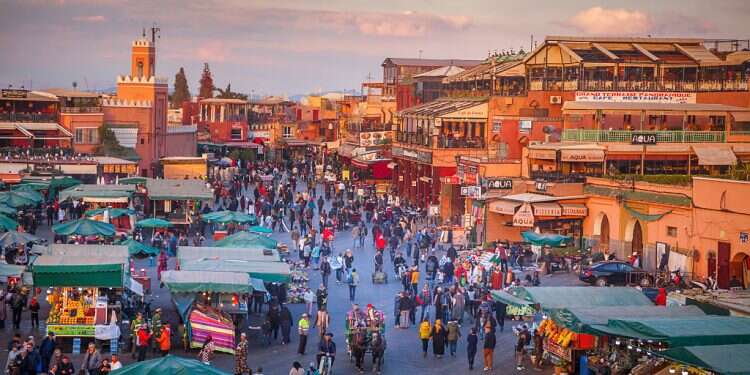The remarkable achievements of the Moroccan national team in the FIFA World Cup 2022 and its qualifying to the semifinals have put the country of the Maghreb in the headlines. Overnight the team has become the undisputed representative of the Arab world in its battle for the coveted trophy; disappointment at the Moroccan players' identifying with the Palestinians did not taint the joy felt by the team's fans.
Follow Israel Hayom on Facebook, Twitter, and Instagram
Only two years have passed since ties between the two countries have been restored, but it seems as if these were never severed in the first place. In regard to the ongoing struggle for world order and the crises raging through world economies, Israel and Morocco can offer solutions that will help in dealing with current challenges. These solutions may bring the relative advantage of each country to light, as well as the partnership between them. Today, more than ever, the time is right for another step up in the ties that have developed between Jerusalem and Rabat.
The historic agreement, mediated by the Trump administration, was part of the Abraham Accords. As part of the Accords, Morocco became the fourth Arab country to establish ties with the State of Israel within several months. The triple declaration changed the map beyond recognition and created a new era between the two countries. Two decades earlier, in 2000, Morocco severed its ties with Israel following the Second Intifada. And surely, the strong ties remain an integral part of the heritage of the two nations.
A Small Community, A Long Tradition
The history of the Jewish people in Morocco is deep; spanning more than a thousand years. It is believed that Jews first arrived in Morocco after the destruction of the Second Temple. Over many centuries, Morocco welcomed and accepted many Jewish scholars from Spain and its surroundings, and it itself became a stronghold of Jewish life, despite religious persecutions and severe hardships that befell the Jews. The city of Essaouira even set a precedent in the Muslim world, when it became the only city with a Jewish majority.
Throughout the generations, Jews immigrated from Morocco to Israel. Immigrants from Morocco took part in the 19th-century revival of the Jewish settlement and in the development of many cities, including Jaffa, Haifa, Tiberias, and Jerusalem. In the first decades after the establishment of the State of Israel, the majority of Moroccan Jews immigrated to Israel, while a small Jewish community remained in Morocco. Most Moroccan Jews live in Casablanca, with a small minority in Marrakesh. The community is strict about maintaining community customs. With the encouragement of the King of Morocco, projects were initiated for the comprehensive renovation of Jewish cemeteries and neighborhoods in the Jewish quarter where Jews lived.
With the renewal of ties, following the Abraham Accords, direct flights operate between Tel Aviv, Casablanca, and Marrakesh. Morocco has become a popular tourist destination for Israelis. Many agreements were signed between government ministries, academic institutions, companies and organizations in both countries. The sense of collaboration and satisfaction with the renewal of ties does not characterize only the leadership echelon – but is clearly evident on Moroccan streets and in the general attitude towards Israelis.
Optimism is on the Rise
Now, two years after the renewal of ties and after the infrastructure has been established, the time has come to maximize the great potential found in the collaboration between the two countries. Morocco and Israel serve as gateways to the Mediterranean Sea, from the west and the east. Israel, Morocco, and Sudan can cooperate in providing solutions to the global food crisis, which was exacerbated following the war in Ukraine. Even though Sudan has fertile land needed to become an alternative exporter of wheat, it lacks the know-how and tools to do so.
Israel and Morocco can fill in the gap. They can bring Israeli know-how in agritech to Africa, as well as phosphates from Morocco, effecting a change that will benefit the nations of the region. Moreover, due to the global energy crisis and restrictions on gas imports from Russia, regional cooperation could provide alternative solutions. Projects such as the natural gas pipeline between Nigeria and Morocco, the gas pipeline from Israel to Europe, and the oil pipeline from the Gulf to Europe will become even more relevant than ever before. This will result in the formation of jobs in both countries, as well as revenues that will boost their economies.
Alongside governmental collaborations and business opportunities, it is vital to deepen the ties between the citizens of both countries. Morocco recently approved the easing of the entry procedure for Israelis via an electronic visa, and Israel should take similar steps to encourage tourism from Morocco to Israel. In addition, Israel must officially recognize Morocco's sovereignty in Western Sahara. This is a necessary step, after many countries around the world, including the US, have done so. The leadership in Morocco also expects this.
As far as Israel is concerned, in addition to this step contributing to the promotion of ties with Morocco, it will also weaken the Polisario Front, supported by Iran and Hezbollah. Reflecting on the achievements of the last two years, one's heart expands and optimism is rising. This is the outset of a marvelous friendship. Plenty of opportunities lie ahead of us that will bring prosperity and ensure that the peace we have with Morocco will continue to be an example and model for all countries in the region.
Meir Ben-Shabbat, a visiting senior research fellow at the Institute for National Security Studies, served as Israel's national security adviser and head of the National Security Council between 2017 and 2021.
David Aaronson is Deputy Director for Israel at Abraham Accords Peace Institute. He previously served as senior adviser to the minister for regional cooperation.
Subscribe to Israel Hayom's daily newsletter and never miss our top stories!




